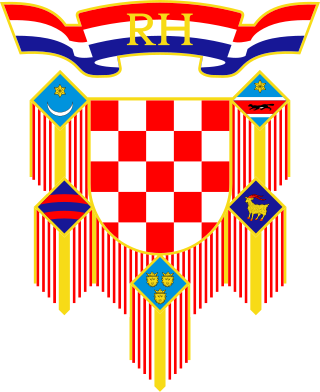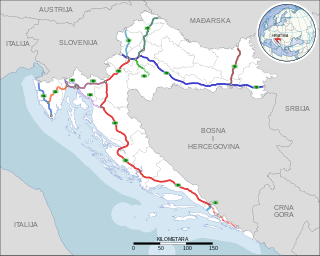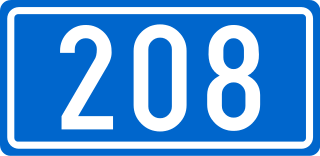Further reading
- Osobni identifikacijski broj i strane osobe (PDF) (in Croatian). 2010. Retrieved 2016-10-30.
The Personal identification number (Croatian : Osobni identifikacijski broj or OIB) is a permanent national identification number of every Croatian citizen and legal persons domiciled in the Republic of Croatia. OIB is determined and assigned by the Tax Administration (Porezna uprava) of the Croatian Ministry of Finance. Personal identification number gradually replaced the Unique Master Citizen Number (JMBG), which had been set up and used in former Yugoslavia.
OIB consists of 11 digits which contain no personal information, unlike the previous unique identification number scheme. The OIB is constructed from ten randomly chosen digits and one digit control number (international standard ISO 7064, module 11.10). For the purposes of international data exchange, the letters HR are added preceding the eleven digits.
The introduction of personal identification number was a gradual process in two phases:
The first phase was implemented throughout the year 2009. During the same year, OIBs were used concurrently with JMBGs on all applications and payments.
Starting with 1 January 2010, tax returns and all payments use OIB only.
Starting with 1 January 2011, it became illegal to collect JMBG's where OIB would have sufficed, because under Croatian law, JMBG is considered to be a piece of personally identifiable information that is protected under the law on the protection of personal information, whereas OIB is not. The penalty for not using OIBs is defined as large monetary fines, multiplied for each violation.

The president of Croatia, officially the president of the Republic of Croatia, is the head of state, commander-in-chief of the military and chief representative of the Republic of Croatia both within the country and abroad. The president is the holder of the highest office in Croatia. However, the president is not the head of the executive branch as Croatia has a parliamentary system in which the holder of the post of prime minister is the most powerful person within the country's constitutional framework and everyday politics.
Regular elections in Croatia are mandated by the Constitution and legislation enacted by Parliament. The presidency, Parliament, county prefects and assemblies, city and town mayors, and city and municipal councils are all elective offices. Since 1990, seven presidential elections have been held. During the same period, ten parliamentary elections were also held. In addition, there were nine nationwide local elections. Croatia has also held three elections to elect members of the European Parliament following its accession to the EU on 1 July 2013.
Unique Master Citizen Number is an identification number that was assigned to every citizen of former Yugoslav republics of the SFR Yugoslavia. It continues to be used in almost all of the countries that were created after the dissolution of Yugoslavia – Bosnia and Herzegovina, Montenegro, North Macedonia, Serbia and Slovenia use it in its original form, while Croatia has switched to a new identification number called the Personal Identification Number.
A national identification number, national identity number, or national insurance number or JMBG/EMBG is used by the governments of many countries as a means of tracking their citizens, permanent residents, and temporary residents for the purposes of work, taxation, government benefits, health care, and other governmentally-related functions.
The National Insurance number is a number used in the United Kingdom in the administration of the National Insurance or social security system. It is also used for some purposes in the UK tax system.

Municipalities in Croatia are the second-lowest administrative unit of government in the country, and along with cities and towns they form the second level of administrative subdisivion, after counties. Each municipality consists of one or more settlements (naselja), which are the third-level spatial units of Croatia.

The Homeland War Memorial is a Croatian state medal awarded to both Croatian and foreign citizens who participated in the nation's Croatian War of Independence as a volunteer, part of the Croatian Army and Croatian Council of Defence or in some other role.

The Grand Order of Queen Jelena, or more fully the Grand Order of Queen Jelena with Sash and Morning Star, is an order of the Republic of Croatia. It was established in 1995. It ranks second in the Croatian order of precedence after the Grand Order of King Tomislav.

Highways in Croatia are the main transport network in Croatia. The Croatian classification includes several classes of highways:

The Croatian identity card is an identity document issued in Croatia. Any Croatian citizen who is resident in Croatia can obtain an ID card and it is compulsory for all citizens over the age of 18. This document is issued by the police on behalf of the Ministry of the Interior.

The D8 state road is the Croatian section of the Adriatic Highway, running from the Slovenian border at Pasjak via Rijeka, Senj, Zadar, Šibenik, Split, Opuzen, and Dubrovnik to the border with Montenegro at Karasovići. Most of the D8 state road remains single carriageway, though with some dual carriageway stretches. The total length of the road through Croatia is 643.1 kilometres (399.6 mi).

The Grand Order of King Petar Krešimir IV, or more fully the Grand Order of King Petar Krešimir IV with sash and Morning Star, is an order of the Republic of Croatia. It ranks third in the Croatian order of precedence after the Grand Order of Queen Jelena. The next order in rank is the Grand Order of King Dmitar Zvonimir. The order had been established on June 20, 1992 and reconstituted on April 1, 1995.

D27 is a state road connecting Gračac in the southern part of Lika, Croatia, to D8 state road via Benkovac. The road is 96.9 kilometres (60.2 mi) long. It also provides an alternative route to the sections of A1 motorway and the D8 state road that cross the Maslenica strait over the two Maslenica bridges, underneath the Velebit. This is especially important when strong wind or storms cause the A1 motorway section between Maslenica Bridge (A1) and Sveti Rok Tunnel to be closed for traffic for safety reasons.

D414 is the main state road on Pelješac peninsula in Croatia connecting towns of Ston and Orebić and ferry ports in Orebić, Trpanj and Prapratno, from where Jadrolinija ferries fly to islands of Korčula and Mljet as well as the mainland port of Ploče, connecting to the D118, D413 and D123 state roads respectively. The road is 64.7 km (40.2 mi) long.

D528 connects the A4 motorway Varaždin interchange to the D2 and D3 state roads, just to the south of the city of Varaždin. The eastern terminus of the road is an intersection with the D2 and D3 state roads, which are concurrent at that location. The road is 2.4 km (1.5 mi) long.

D208 is a state road in Međimurje region of Croatia connecting Trnovec and nearby Trnovec border crossing to Slovenia to D3 state road in Nedelišće near Čakovec, and the road also serves as a connecting road to the A4 motorway as it terminates near Čakovec interchange via the D3. The road is 6.9 km (4.3 mi) long.
The national symbols of Croatia are insignia, icons, or cultural expressions that are emblematic, representative, or otherwise characteristic of the Republic of Croatia, Croatian people, or the Croatian culture. They are being implemented within the country and abroad as a form of representation for the nation's statehood or its unique cultural aspects.

The JMBG protests were demonstrations in Sarajevo, Bosnia and Herzegovina between June–July 2013. The acronym JMBG stands for Jedinstveni matični broj građana, the identification number granted to citizens.
The Government of Croatia and the Holy See have signed four bilateral agreements and a protocol. Although the agreements proved controversial owing to great one-time and continuous financial and other burdens the agreements put on the Croatian state, no government of Croatia ever attempted to amend them. From the perspective of international law, these agreements may be seen as unjust to Croatia because of putting obligations chiefly on the Croatian state, but not on the Holy See.

Road signs in Croatia are regulated in Pravilnik o prometnim znakovima signalizaciji i opremi na cestama. The shape and design of the road signs largely follow the road signs used in most European countries, including European Union countries, to which Croatia joined in 2013. A similar design of road signs is used in the neighboring countries of the former Yugoslavia like Slovenia, Bosnia and Herzegovina, and also North Macedonia.